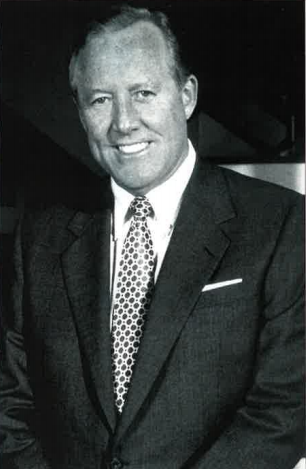The Peacemaker: As chairman of industry leader and insurance giant Mutual of America, William J. Flynn has done mush for peace in Ireland over the last decade.
Bill Flynn is fond of recounting a particular childhood memory: growing up during the Depression he once asked his father why their neighbor had to eat at their house every night. His father replied, “Because I have a job.”
The story says as much about Bill Flynn as it does about his father, providing some insight into the importance he places on people and the dignity he invests in human interaction. It is a humanism that has characterized his wildly successful business career at the helm of insurance giant Mutual of America. It also explains Flynn’s modus operandi — one person can make a difference.
And make a difference he does, time and again, wherever he chooses to focus his efforts, whether it be in business, politics or the community. And lucky for the tiny island of Ireland that he has chosen to focus his efforts on winning peace in its northeast corner.
The son of Irish immigrants — his father was from County Down and his mother from Mayo — Flynn was instilled with a deep sense of pride in his Irish heritage and gratitude for the opportunities so many Irish immigrants found on this side of the Atlantic. The young Flynn attended Cathedral High School and later Cathedral College for the Immaculate Conception, where he briefly studied for the priesthood. And although he opted for a different path, a certain spirituality or faith still colors all he does.
He graduated from Fordham University in 1951 and went to work for the Equitable Life Assurance Society. In 197 I, he joined a struggling life insurance company called Mutual of America and over the past 28 years has turned it into a $10 billion-plus company, ranked one of the top 50 U.S. life insurance companies.
In keeping with Flynn’s personal philosophy, the company has also distinguished itself for its charitable efforts and public affairs. One of its most widely-acclaimed achievements was its international conference called “Anatomy of Hate” held in Derry, Oslo and Paris in 1990. The conference brought together some 70 Nobel Laureates, statesmen and politicians — including former U.S. president Jimmy Carter, Vaclav Havel, Henry Kissinger and Nelson Mandela — to explore the effects of hatred on people and society as a whole. In referring to that conference, Flynn states that its aim was “to learn how to use the tools of research and the lessons of history to begin eliminating the bigotry and racism that cause hatred.” It is this desire to combat hatred that characterizes his involvement in Ireland.
Ironically, Flynn’s support for Ireland grew out of his refusal to help an Irish cause. In the late 1980s he was asked by two members of Noraid to contribute to their organization. Flynn declined, unwilling to contribute money that might be used to buy arms or weapons. The two fundraisers confronted Flynn though, asking him what he was going to do about the injustices in Northern Ireland. In Flynn’s words, it was the first time he was made to feel like a draft dodger. From that point on, he has refused to sit idly by and has become an active player in the peace process in Northern Ireland. As former governor Hugh Carey is fond of saying, “Bill Flynn takes on all the tough assignments.”
Perhaps his one single move that has had the greatest impact on the peace process in Northern Ireland, and one might argue, jump-started the peace process, was the role he played in securing a visa for Sinn Féin leader Gerry Adams. As chairman of the National Committee on American Foreign Policy, he invited the leaders of all political parties in Northern Ireland to attend a conference on peace in Northern Ireland in New York.
His invitation to Gerry Adams forced President Clinton to make good on his implied election promise to the Irish American community that he would provide Adams a visa into the U.S. The result was a 24-hour visa and whirlwind tour for Adams that broke ground for later U.S. visits and the subsequent IRA ceasefire. Flynn dragged the U.S. into the political situation in Northern Ireland giving it the attention and weight necessary to bring about the Northern Ireland peace process. He saw his role in this process as nothing more than his responsibility, saying, “As the first Irish American chairman of NCAFP, I could do nothing less than raise the question.”
But Flynn’s involvement hardly ended there. He has also led two delegations to Northern Ireland to push for economic investment and peace in the region. This past summer, in spite of warnings that his safety could not be guaranteed, he traveled as part of a team of American observers to Drumcree, Northern Ireland, one of the flashpoints during the marching season.
He is president of the board of Flax Trust America and a member of the Ireland America Advisory Board. He is a past chairman of the Ireland Chamber of Commerce in the U.S.A. and has been a board member of Co-Operation Ireland. And his work has not gone without tribute. Two years ago he was the inaugural recipient of the Initiative for Peace Award from the National Committee on American Foreign Policy, and in 1996 he led the New York St. Patrick’s Day Parade up Fifth Avenue as Grand Marshall. In 1994, he was named Irish American of the Year by this publication.
While there are many who argue with justification that business and politics should not mix, the monumental role this one business leader has played in pushing Northern Ireland toward peace must give any critic pause. Thanks to Bill Flynn, Northern Ireland was able to realize one shining, brief moment, when, to paraphrase the poet Seamus Heaney, hope and history rhymed. For this, we can never thank him enough.♦


Leave a Reply